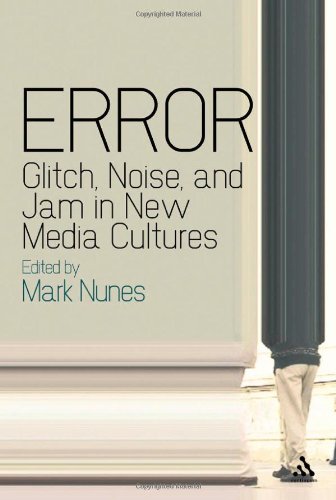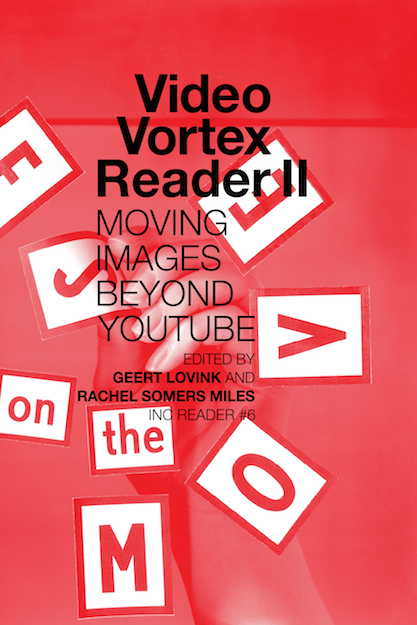Mark Nunes (ed.): Error: Glitch, Noise, and Jam in New Media Cultures (2010)
Filed under book | Tags: · botnet, error, facebook, glitch, hacktivism, machinima, media culture, new media, noise, tactical media, wikipedia, youtube

Divided into three sections, Error brings together established critics and emerging voices to offer a significant contribution to the field of new media studies. In the first section, “Hack,” contributors explore the ways in which errors, glitches, and failure provide opportunities for critical and aesthetic intervention within new media practices. In the second section, “Game,” they examine how errors allow for intentional and accidental co-opting of rules and protocols toward unintended ends. The final section, “Jam,” considers the role of error as both an inherent “counterstrategy” and a mode of tactical resistance within a network society. By offering a timely and novel exploration into the ways in which error and noise “slip through” in systems dominated by principles of efficiency and control, this collection provides a unique take on the ways in which information theory and new media technologies inform cultural practice.
Publisher Continuum International Publishing Group, 2010
ISBN 144112120X, 9781441121202
288 pages
Download (link removed by request from publisher)
Geert Lovink, Rachel Somers Miles (eds.): Video Vortex Reader II: Moving Images Beyond YouTube (2011)
Filed under book | Tags: · aesthetics, human rights, internet, media activism, network culture, online video, politics, theory, video, video art, youtube

“Video Vortex Reader II is the Institute of Network Cultures’ second collection of texts that critically explore the rapidly changing landscape of online video and its use. With the success of YouTube (’2 billion views per day’) and the rise of other online video sharing platforms, the moving image has become expansively more popular on the Web, significantly contributing to the culture and ecology of the internet and our everyday lives. In response, the Video Vortex project continues to examine critical issues that are emerging around the production and distribution of online video content.
Following the success of the mailing list, the website and first Video Vortex Reader in 2008, recent Video Vortex conferences in Ankara (October 2008), Split (May 2009) and Brussels (November 2009) have sparked a number of new insights, debates and conversations regarding the politics, aesthetics, and artistic possibilities of online video. Through contributions from scholars, artists, activists and many more, Video Vortex Reader II asks what is occurring within and beyond the bounds of Google’s YouTube? How are the possibilities of online video, from the accessibility of reusable content to the internet as a distribution channel, being distinctly shaped by the increasing diversity of users taking part in creating and sharing moving images over the web?”
Contributors: Perry Bard, Natalie Bookchin, Vito Campanelli, Andrew Clay, Alexandra Crosby, Alejandro Duque, Sandra Fauconnier, Albert Figurt, Sam Gregory, Cecilia Guida, Stefan Heidenreich, Larissa Hjorth, Mél Hogan, Nuraini Juliastuti, Sarah Késenne, Elizabeth Losh, Geert Lovink, Andrew Lowenthal, Rosa Menkman, Gabriel Menotti, Rachel Somers Miles, Andrew Gryf Paterson, Teague Schneiter, Jan Simons, Evelin Stermitz, Blake Stimson, David Teh, Ferdiansyah Thajib, Andreas Treske, Robrecht Vanderbeeken, Linda Wallace, Brian Willems, Matthew Williamson, Tara Zepel.
Publisher Institute of Network Cultures, Amsterdam, 2011
Creative Commons Attribution Noncommercial No Derivative Works 3.0 Netherlands License
ISBN 9789078146124
378 pages
PDF, PDF (updated on 2017-4-11)
Comment (0)Jodi Dean: Blog Theory: Feedback and Capture in the Circuits of Drive (2010)
Filed under book | Tags: · blogging, blogosphere, capitalism, communicative capitalism, critical theory, facebook, floss, free software, media theory, neoliberalism, psychoanalysis, technology, utopia, web 2.0, youtube

“Blog Theory offers a critical theory of contemporary media. Furthering her account of communicative capitalism, Jodi Dean explores the ways new media practices like blogging and texting capture their users in intensive networks of enjoyment, production, and surveillance. Her wide-ranging and theoretically rich analysis extends from her personal experiences as a blogger, through media histories, to newly emerging social network platforms and applications.
Set against the background of the economic crisis wrought by neoliberalism, the book engages with recent work in contemporary media theory as well as with thinkers such as Giorgio Agamben, Jean Baudrillard, Guy Debord, Jacques Lacan, and Slavoj Zizek. Through these engagements, Dean defends the provocative thesis that reflexivity in complex networks is best understood via the psychoanalytic notion of the drives. She contends, moreover, that reading networks in terms of the drives enables us to grasp their real, human dimension, that is, the feelings and affects that embed us in the system.
In remarkably clear and lucid prose, Dean links seemingly trivial and transitory updates from the new mass culture of the internet to more fundamental changes in subjectivity and politics. Everyday communicative exchanges–from blog posts to text messages–have widespread effects, effects that not only undermine capacities for democracy but also entrap us in circuits of domination.”
Publisher Polity, 2010
ISBN 0745649696, 9780745649696
140 pages
Reviews: Jussi Parikka (Leonardo, 2010), Julia Lupton (LA Review of Books, 2012), Matthew Flisfeder (Reviews in Cultural Theory, 2012), McKenzie Wark (Public Seminar, 2015).
PDF (updated on 2020-5-31)
Comment (0)
